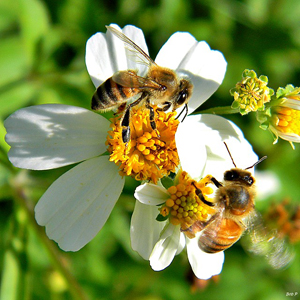 |
Center for Food Safety’s (CFS) recent legal victory has made the United States safer for bees! A federal court found the Environmental Protection Agency’s (EPA) approval of many neonicotinoid pesticides illegal. These pesticides must now be pulled off the market and re-assessed. Neonicotinoids are linked to colony collapse in honey bees, bird population declines, and harm to aquatic life and other essential insect pollinators.
Pesticides, parasites, and climate change are all having a profound effect on pollinators. As pollinator populations decline, many crops that humans utilize for food are endangered.
CFS has also filed a suit against the EPA demanding that seeds coated in neonicotinoid pesticides are regulated as well. Cornucopia will be watching these cases as they unfold.
Home gardeners can protect local pollinators by using organic seed and plant starts whenever possible.
CENTER FOR FOOD SAFETY SECURES LEGAL VICTORY FOR BEES!
CFS Blog
by Brenna Norton, Development Manager
CFS scored another huge legal victory! As a result of our lawsuit against EPA, 12 toxic, bee-killing “neonic” pesticides will soon be withdrawn from the market!
Neonicotinoids (neonics) are a relatively new class of insecticides, related to nicotine. These pesticides interfere with the nervous system of insects, causing tremors, paralysis, and eventually death at very low doses. Numerous scientific studies have demonstrated that exposure to neonics is one factor in the decline of bee populations around the world over the last decade or two.
Unfortunately, neonics are now the most widely used insecticides in the world. They are systemic chemicals, which means neonics are distributed throughout the plant, making the entire plant toxic. Bees and other pollinators are exposed to these toxic chemicals through pollen, nectar, dust, dew droplets on plant leaves, and in the soil where many native bee species nest.

